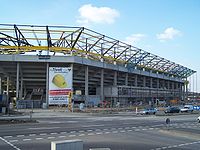
Tivoli, Aachen
Encyclopedia
The Old Tivoli in Aachen
, Germany
, was the stadium
of Aachen's best known football team Alemannia Aachen
until 2009.
in central Italy
. The club later built a football ground there. In 1925 more land was added to the lease, and the construction of the stadium was started. Inaugurated on 3 June 1928 it had a capacity of 11,000.
After World War II
Alemannia Aachen played in the Oberliga West, and the stadium became too small. In September 1953 a standing tribune was built (the Würselener Wall.) It wasn't until 1957 that seats were added to the tribune and lighting for nighttime events. The new stadium was inaugurated on 28 August 1957 with a game against RCD Espanyol
. Additional seating areas were also later constructed.
 On 17 May 2008, Alemannia Aachen began building a new stadium also named Tivoli nearby, which replaced the old stadium on 17 August 2009.
On 17 May 2008, Alemannia Aachen began building a new stadium also named Tivoli nearby, which replaced the old stadium on 17 August 2009.
Aachen
Aachen has historically been a spa town in North Rhine-Westphalia, Germany. Aachen was a favoured residence of Charlemagne, and the place of coronation of the Kings of Germany. Geographically, Aachen is the westernmost town of Germany, located along its borders with Belgium and the Netherlands, ...
, Germany
Germany
Germany , officially the Federal Republic of Germany , is a federal parliamentary republic in Europe. The country consists of 16 states while the capital and largest city is Berlin. Germany covers an area of 357,021 km2 and has a largely temperate seasonal climate...
, was the stadium
Stadium
A modern stadium is a place or venue for outdoor sports, concerts, or other events and consists of a field or stage either partly or completely surrounded by a structure designed to allow spectators to stand or sit and view the event.)Pausanias noted that for about half a century the only event...
of Aachen's best known football team Alemannia Aachen
Alemannia Aachen
Alemannia Aachen is a German football club from the western city of Aachen, North Rhine-Westphalia. A long term fixture of the country's second division, Alemannia enjoyed a three-year turn in the top flight in the late 1960s and, after a successful 2005–06 campaign, returned to first division play...
until 2009.
Overview
In 1908, the city of Aachen leased the area of the old manor Tivoli to the club, named after the inn Gut Tivoli which was located there since the 19th century, in turn taking its name from the town of TivoliTivoli, Italy
Tivoli , the classical Tibur, is an ancient Italian town in Lazio, about 30 km east-north-east of Rome, at the falls of the Aniene river where it issues from the Sabine hills...
in central Italy
Italy
Italy , officially the Italian Republic languages]] under the European Charter for Regional or Minority Languages. In each of these, Italy's official name is as follows:;;;;;;;;), is a unitary parliamentary republic in South-Central Europe. To the north it borders France, Switzerland, Austria and...
. The club later built a football ground there. In 1925 more land was added to the lease, and the construction of the stadium was started. Inaugurated on 3 June 1928 it had a capacity of 11,000.
After World War II
World War II
World War II, or the Second World War , was a global conflict lasting from 1939 to 1945, involving most of the world's nations—including all of the great powers—eventually forming two opposing military alliances: the Allies and the Axis...
Alemannia Aachen played in the Oberliga West, and the stadium became too small. In September 1953 a standing tribune was built (the Würselener Wall.) It wasn't until 1957 that seats were added to the tribune and lighting for nighttime events. The new stadium was inaugurated on 28 August 1957 with a game against RCD Espanyol
RCD Espanyol
Reial Club Deportiu Espanyol de Barcelona is a sports club based in Barcelona, Spain. It is best known for its football team. Espanyol currently play in the Estadi Cornellà-El Prat with seats for 40,500 spectators. It was inaugurated on 2 August 2009...
. Additional seating areas were also later constructed.
New Tivoli

External links
- Alemannia Aachen on their stadium (German)

